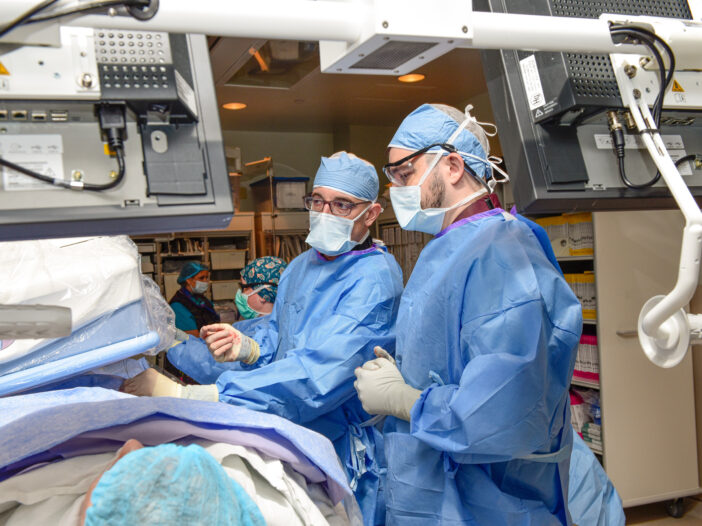
Structural heart disease is any type of abnormality of the heart’s muscle, valves, arteries or other supporting structures. The most common type of structural heart disease is aortic stenosis, which affects about 1.5 million Americans.
In the past, open heart surgery offered the only option for repairing structural heart conditions. But now, minimally invasive surgery offers you or your loved one a far less complex way to correct some structural heart and valve problems. Our heart providers have expertise in all types of heart valve surgeries, including minimally invasive aortic valve and mitral valve surgery. We offer valve repair as well as both aortic valve replacement (AVR) and transcatheter aortic valve replacement (TAVR)] a revolutionary, minimally invasive alternative to open heart surgery.
What is Structural Heart and Valve Disease?
Aortic stenosis is a condition that affects the aorta, which is the main artery through which blood flows from the heart to the rest of your body. The aortic valve must open fully to allow blood to flow and then close to prevent blood from flowing back into the heart. When your aortic valve doesn’t function properly, blood flow from the heart is decreased and the heart must work harder to pump blood, which can cause thickening of the heart as well as chest pain. Over time, blood can back up into your lungs.
Although aortic stenosis can develop before birth (congenital aortic stenosis), it is more likely to occur later in life, because of a buildup of calcium deposits on the aortic valve. Aortic stenosis afflicts about 2 percent of people over age 65. It’s important to diagnose and replace faulty heart valves, because if you have severe aortic stenosis and don’t have the valve replaced, the chance of dying in two to three years increases by roughly 50 percent.
Another common type of structural heart disease is mitral valve stenosis. The mitral valve is located between the left atrium and the left ventricle of the heart and controls blood to flow from the left atrium into the left ventricle. Problems with this valve can make it harder for your heart to pump blood properly.
Recognize Valve Disorder Symptoms
Valve disorders can cause the following symptoms:
- Chest pain or discomfort that may worsen with activity
- A feeling of pressure or squeezing in the chest that can extend into the arm, jaw or neck
- Cough, sometimes bloody
- Trouble breathing during activity
- Fatigue
- Heart palpitations
- Fainting
- Weakness, lightheadedness or dizziness, particularly with activity
- Swelling of the feet or legs
How Do You Determine Structural Heart Disease?
To diagnose structural heart disease, your cardiologist starts by giving you a physical exam and talking with you about your symptoms and health history. You may also receive one or more of the following diagnostic tests:
- Electrocardiogram (ECG): This test uses small sensors (electrodes) attached to your chest and arms to record electrical signals as they travel through your heart.
- Echocardiogram: In this noninvasive test, sound waves are used to produce a video image of your heart in motion.
- Chest X-ray: This test can show whether your heart is enlarged and whether you have enlarged blood vessels or calcium buildup in your heart.
- Cardiac stress test (also known as a treadmill test or exercise EKG or ECG): This test measures how your heart performs in response to exercise or stress by monitoring blood flow and oxygen levels as your heart beats faster and works harder.
- Cardiac computerized tomography (CT) scan. This test uses a series of X-rays to look at the size and condition of your heart and heart valves.
- Catheterization and angiogram: During this test, a cardiologist guides a catheter (a thin plastic tube) through an artery in the arm or leg into coronary arteries. Dye is injected through the catheter, to make images that can be captured in an X-ray. This test allows your providers to look at your heart and heart valves.
- Cardiac MRI: This test uses magnets and radio waves to create images of your heart as it beats. It can give your providers a better idea of whether your heart or valves are damaged.
